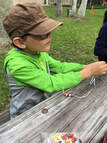|
Talking About
Florida Homeschooling... Evaluations and More |
A good evaluator works for the parents, assisting them in meeting legal requirements and in supporting them when districts overstep their bounds." |
Preparing to Possibly Enter the Military
Helpful Organizations/Activities We began my son's journey into the military a few years in advance when he joined one of the many youth organizations affiliated with a branch of the military. Many are familiar with Junior Reserve Officer Training (JROTC) groups in high schools, but others operate as clubs that meet after school hours or on weekends and usually are not affiliated with a school. Young Marines are associated with the US Marine Corps; Sea Cadets with the Navy; Civil Air Patrol with the Air Force. These are not recruiting organizations; joining one does not obligate a student to join the military after graduation. They are youth organizations meant to teach self-discipline, leadership skills, teamwork, and more, along with lessons against addiction. They periodically host encampments (camping trips) and may march in parades and perform community service; they host leadership training events, encourage respect, promote patriotism, and more. The students wear a military-style uniform, practice military-style exercises, earn rank, learn to lead groups, and more. These groups can help students decide if the military life might be a good fit for them and can help them learn skills, information, courtesies, and more that will help prepare them to do well in boot camp and beyond. They'll teach them how to work on promotions in both the youth group and the actual military, and those students who perform well in them and go on to enlist in the military can begin at a higher rank and pay grade. Earning the rank of Eagle Scout in Boy Scouts or earning a certain number of college credits (at least 15 for the Marines) prior to joining are other routes to beginning a military career with a rank boost. If a student is at least 17 years old and no more than a year away from high school graduation, the Delayed Entry Program (DEP) is another option for preparing for a possible military career. A visit to a recruiter can be a good option. The recruiter may give the student a practice ASVAB test online and ask for a demonstration of physical fitness as part of an initial assessment. Those who are seriously interested will be asked to meet weekly with the recruiter and other students to work on improving physical fitness, improve knowledge for the ASVAB (Armed Services Vocational Aptitude Battery of tests), and learn more information about military life. Those who do well will be given the opportunity to formally sign up for the DEP in which they commit to join the military and secure a commitment to three possible career tracks and will officially earn the rank of Poolee. Some Poolees will earn positions of leadership as they help lead workout sessions and check in on other young people in the program. Such a position of leadership can also lead to an immediate increased rank after boot camp. Testing Studying for ASVAB test can be important for potential service members. The ASVAB tests are used to weed out potential service members who are not up to the military's standards but the scores will also play a role in determining promotion eligibility for years to come. The tests including typical academic sections but also have sections on topics like mechanics and electronics that will help the military decide the best career paths for service members. Many books and YouTube videos are dedicated to helping students improve their performance on the ASVAB. I read and was told, over and over again, that a student interested in joining the military should NOT get a GED. The military strictly limits the number of GED holders allowed to join the military today. For those who do manage to get in with a GED, the GED then limits their promotion potential for a long time to come. Earning a diploma from parents looks much better to the military in part because the GED is viewed as a test for those who quit school. A student who earns a homeschool diploma is accepted by the military as Tier 1 per HSLDA (a group of homeschooling lawyers). (Not all recruiters will know this. When my son went to enter the DEP, Delayed Entry Program, that allows young people who are at least 17 to begin the process of enlisting up to about a year before they will actually ship out, the recruiter wasn't sure how to handle him because of his homeschooling. While he was looking up what to do, I mentioned that HSLDA says that homeschoolers are Tier 1 applicants. Since the recruiter then found that phrase used in official documents, he realized I knew what I was doing and more readily accepted documents I provided.) Documentation The military, like bureaucracies in general, loves paperwork. Having documentation in order is important to getting accepted into the military. Before my son could join the DEP, they wanted proof that he was on track to graduate from high school within one year. For this, they wanted to see a notarized transcript as well as proof from the school district that he was homeschooled according to Florida law--a letter from the local Home Education Liaison gave them proof of the latter. A lawyer from HSLDA explained that they wanted to see that my son would be homeschooled for more than one school year to ensure that he wasn't homeschooled as an alternate to dropping out of high school. Officers who verified his paperwork wanted more documentation. I typed a list of graduation requirements (I used the public school requirements) and noted the requirements he'd earned already and what he had left to finish. And I gave them a list of course descriptions for the classes he'd already taken. They were satisfied for the DEP. You can type your child's diploma once he or she graduates, but we used a service to print up a professional-looking one as the young person will be required to present the actual diploma in person as part of the military's processing-in. Joining as an Officer If your child prefers to join the military as an officer, earning a college degree is an important first step. Joining ROTC at a college can help pay for the college education, but will also require a commitment to join the military after graduation and participate in regular ROTC trainings. Some students prefer to earn their college degree through a service academy specifically geared to a military career. It is possible to begin a military career as an enlisted person and earn a college while enlisted and then become an officer. Other Tips If your child wants to join the military, a recruiter should have flyers for you, the parent, that contain information and a link to military support groups that can help parents figure out a lot that can help the young person navigate his (or her) way through their system. How to Enter the Military as a Homeschooler https://www.homeschool.com/.../how-to-enter-the.../... Cheryl Trzasko--proud mom and former Adjutant of the Young Marines of the Palm Beaches FLHomeschoolEvaluations.com
0 Comments
Your comment will be posted after it is approved.
Leave a Reply. |
Archives
April 2024
Categories
All
|

 RSS Feed
RSS Feed







